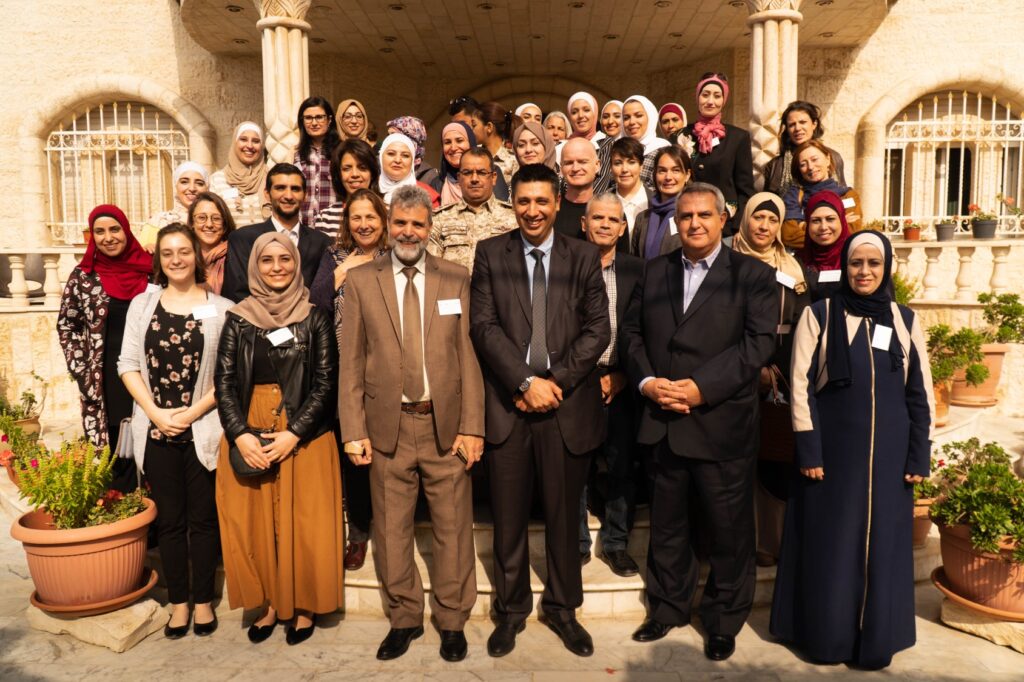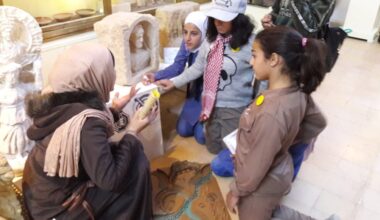Project summary
MaDiH (مديح) is a collaborative project between King’s Digital Lab (KDL) at King’s College London, the Hashemite University (HU), the Council for British Research in the Levant (CBRL), the Department of Antiquities of Jordan (DoA), the Jordan Open Source Association (JOSA), and the Endangered Archaeology in the Middle East and North Africa (EAMENA) project. The goal of the project was to contribute to the long-term sustainable development of Jordan’s digital cultural heritage by identifying key systems, datasets, standards, and policies, and aligning them to government digital infrastructure capabilities and strategies.
Project details
Location: Jordan
Year(s): 2019-2021
Project director(s):
- Dr James Smithies (MaDiH Project Principal Investigator/ UK)
- Prof Fadi Bala’awi (MaDiH Project Principal Investigator/ Jordan)
Project team:
- Dr James Smithies, King’s Digital Lab (KDL)
- Prof Fadi Bala’awi, Hashemite University (HU)
- Dr Andrea De Silva Zerbini, Council for British Research in the Levant (CBRL) 07.07.1984 – 12.07.2019
- Dr Carol Palmer, Council for British Research in the Levant (CBRL)
- Dr Pascal Flohr, EAMENA project, Oxford University
- Shatha Mubaideen, Council for British Research in the Levant (CBRL)
- Dr Alessandra Esposito, King’s Digital Lab (KDL)
- Prof Sahar Idwan, Hashemite University (HU)
- Prof. Shaher Rababeh, Hashemite University (HU)
- Arzaq Yousef, Council for British Research in the Levant (CBRL)
- Raya Sharbain, Jordan Open Source Association (JOSA)
- Issa Mahasneh, Jordan Open Source Association (JOSA)
Lead institutions and funding:
- King’s Digital Lab (KDL) at King’s College London (KCL)
- Hashemite University (HU)
- Council for British Research in the Levant (CBRL)
- Department of Antiquities of Jordan (DoA)
- Jordan Open Source Association (JOSA)
- Endangered Archaeology in the Middle East and North Africa (EAMENA) project.
- Arts and Humanities Research Council (AHRC)
- Newton Khalidi Fund
Also see: MaDiH (مديح) – Mapping Digital Cultural Heritage in Jordan (madih-jordan.org)
See here for the MaDiH entry on the UKRI gateway to publicly funded research and innovation.
Project description
The rich and diverse cultural heritage of Jordan has attracted the attention of the research community to explore, study, interpret, protect and present this heritage to the world. Numerous international, regional and local organisations or individuals have produced (meta)data as part of their study of Jordan’s heritage, in various forms describing myriad products of material and cultural history of the country.
The MaDiH project aimed at collecting all the content on Jordanian cultural heritage under one umbrella to enable international and local researchers and all interested parties to easily access, search and explore this wealth of information.
The creation of a robust technical and operational architecture for digital cultural heritage intends to assist the organizations concerned with cultural heritage in their planning processes, to help in developing their systems, to facilitate the aggregation of valuable datasets held in disparate repositories, and to ensure data generated from research activity is properly stored and widely accessible. The analysis will also result in the identification of infrastructural gaps and opportunities for further development, including system development, data aggregation and online learning.
One of the main aims of the MaDiH (مديح) project is to provide the public, heritage professionals, and researchers with a national repository, listing the datasets and information on Jordanian cultural heritage found over the course of the project. This repository will be the core of the prototype for a national data catalogue of Jordanian cultural heritage. A series of workshops with stakeholders from the cultural heritage field, including researchers, government officials, and IT developers will ensure that the project fulfils the needs of the local community and is aligned to educational and commercial needs and opportunities.
Key outputs from MaDiH (مديح), available online, include:
– A Policy White Paper, identifying relevant national and international policies, frameworks, and standards and making recommendations for their future adoption and/or implementation.
– A Technical White Paper, listing requirements for improvements to existing infrastructure, systems, and tools and make recommendations for their future implementation.
– A prototype National Data Catalogue, listing the datasets found over the course of the project.
Project bibliography
Flohr, Pascal; Esposito, Alessandra; Mubaideen, Shatha. 2021. Mapping Digital Cultural Heritage in Jordan (MaDiH) Project. Bulletin of the Council for British Research in the Levant 2020, p 24-25.
Smithies, James, Bala’awi, Fadi, Flohr, Pascal, Mubaideen, Shatha, Esposito, Alessandra, Idwan, Sahar, … Rababeh, Shaher. 2021. MaDiH (مديح): Mapping Digital Cultural Heritage in Jordan Technical White Paper (English Version) (Version 1.0)
Smithies, James, Bala’awi, Fadi, Flohr, Pascal, Mubaideen, Shatha, Esposito, Alessandra, Idwan, Sahar, … Rababeh, Shaher. 2021. MaDiH (مديح): Mapping Digital Cultural Heritage in Jordan Policy White Paper (English Version) (Version 1.0).
James Smithies, Pascal Flohr, Fadi Bala’awi, Sahar Idwan, Carol Palmer, Alessandra Esposito, Shatha Mubaideen, Shaher Rababeh. 2022. MaDiH (مديح): A Transnational Approach to Building Digital Cultural Heritage Capacity. ACM Journal on Computing and Cultural Heritage.
Project media gallery

Published:29 June 2021















